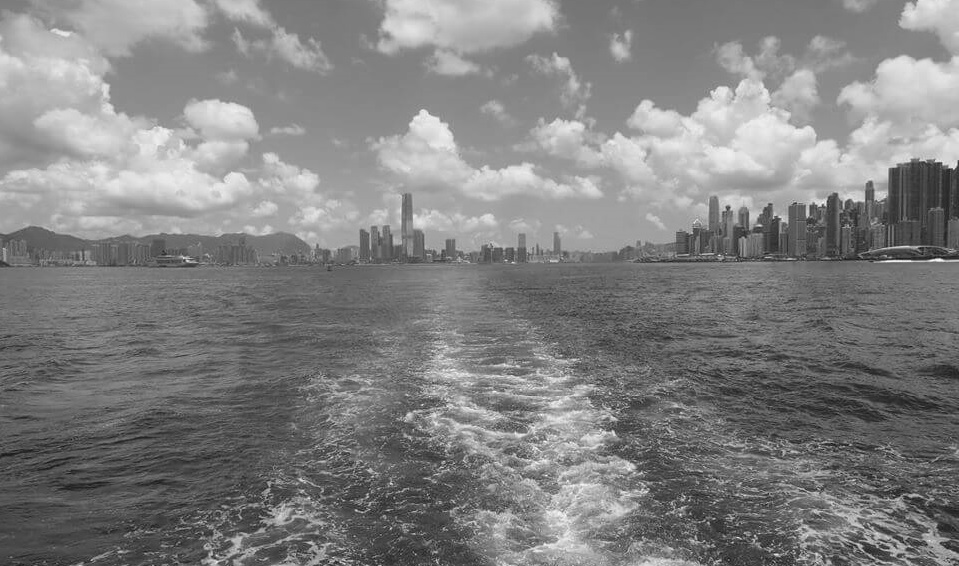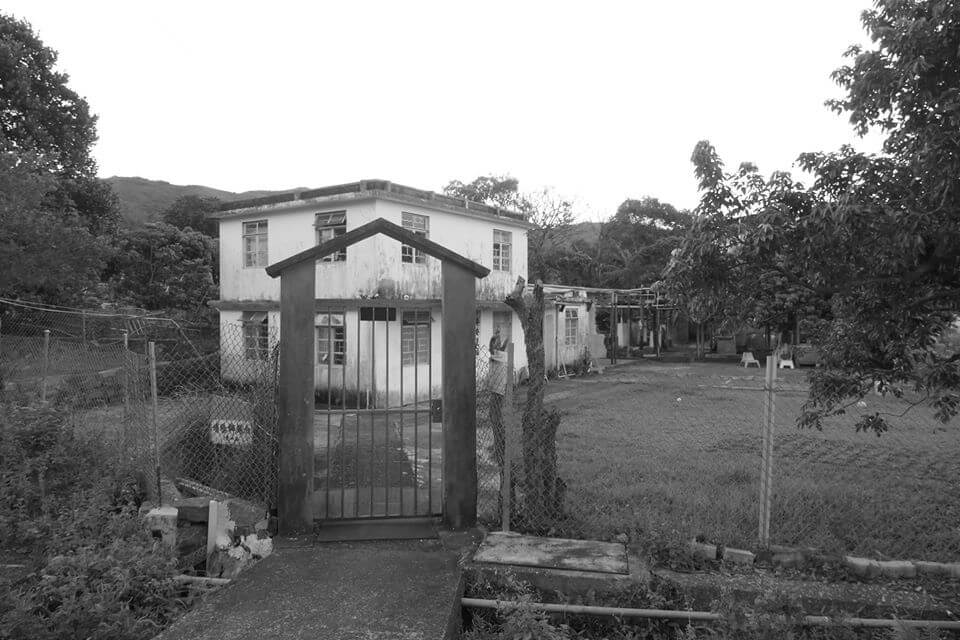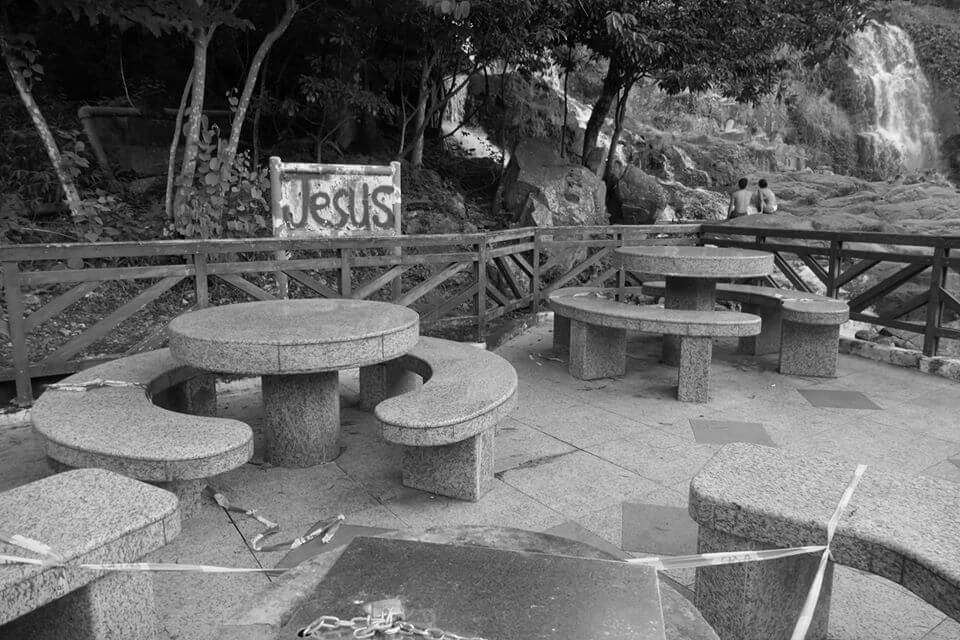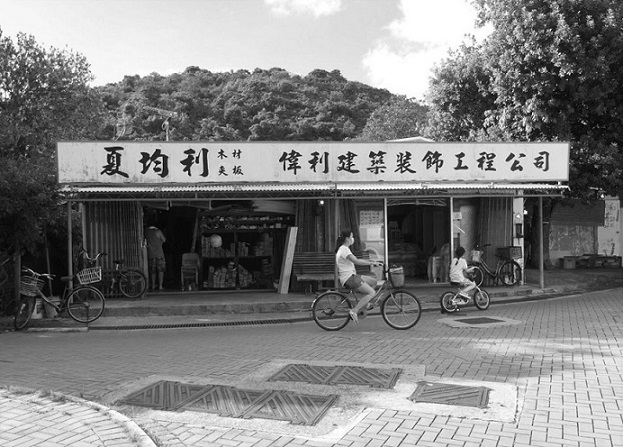Reviews & Articles
大嶼山童心之旅 | A Childlike Trip to Lantau
John BATTEN
at 11:48am on 23rd September 2020





圖片說明:
1. 香港,前往大嶼山的渡輪,背景為港島,2020年8月14日
2. 香港,大嶼山,梅窩附近的村屋和花園,2020年8月14日
3. 香港,大嶼山,新界鄉議局南約區中學,粗野主義建築,2020年8月14日
4. 香港,大嶼山,淳樸中的「Jesus」(瀑布旁懶洋洋的愛侶、圍封的燒烤場),2020年8月14日
5. 香港,大嶼山,在梅窩大街踏單車,2020年8月14日
所有照片由作者提供
Captions:
1. Hong Kong in background, ferry to Lantau Island, Hong Kong, 14 August 2020
2. Village house and garden, near Mui Wo, Lantau, Hong Kong, 14 August 2020
3. New Territories Heung Yee Kuk Southern District Secondary School, brutalist architecture, Lantau, Hong Kong, 14 August 2020
4. Jesus in ‘Arcadia’ (lazing lovers, closed-off BBQ area next to waterfall), Lantau, Hong Kong, 14 August 2020
5. Cycling on Mui Wo’s main street, Lantau, 14 August 2020
All Photos: John Batten
(Please scroll down for English version)
回想上世紀六、七十年代自己童年漫長悠閒的暑假,我很難想像香港今年和去年兩個夏天會在青少年心目中留下什麼印象。去年夏日,空氣中瀰漫的是催淚氣,今年卻是令人生畏的病毒。口罩大概是兩個夏天的連繫。去年,政府為了阻止人們在升溫的示威事件中隱藏身份而禁止蒙面;今年,在新冠病毒肆虐下,口罩變成必要的抗疫措施。去年夏天,示威者成功阻止了可能導致引渡送返中國內地的法例。今年夏天,內地頒布的國家安全法不但把一切逆轉,還引發國際對法例的強烈抵制,而非常諷刺的,是新法例已引發一些西方國家暫停和取消與香港現有的引渡協議。
我對童年的印象,背景是模糊的搖滾音樂、遙不可及的國際政治,包括1968年的全球街頭示威、越戰,還有女權主義等眾多演進中的社會運動。那時候我懂的不多––較深入的認識都是隨著年紀、閱讀和切世俗驗才累積起來。
那麼,今年又發生了什麼事?有些事情和我1960年代的夏天頗為相似,證明歷史即使不是在重覆,也是在循環。世界各地都有街頭示威,包括美國、白俄羅斯、泰國、智利、馬里和黎巴嫩。示威訴求可說各式各樣:結束貪腐、獨裁政治、制度上的種族歧視,也有爭取更佳管治、更好的經濟管理、民主和改善代議政府。簡單而言,香港近期的示威並不是異常的。當人們感到有不公義、政府無能和希望在管治生活上更自主時,便會發起示威。
早於遠古時代開始,世界各地的人都希望成自己命運主己主宰,人們一直都是以爭取改變的運動來表達。這些運動可以是個人的、社會的或政治的。就在這星期的埃及,女性在性騷擾和性侵上得到更大保障。為鼓勵受害人舉報性暴力,該國已立例讓舉報女性的身份自動得到保護。進展可以是緩慢的,而且只是小步前行。進展也可以隨時消失而後再恢復過來。改變也可以是開倒車的。特朗普當選總統便令人震驚,因為美式民主被普遍認為是循序漸進的。然而,美國的聯邦制度有著非常多元化的政見,而國家立法機關更包含各種政客:有好的、有壞的,還有瘋的!就像1968年一樣,2020年也是美國的大選年。
兒童也許會忘記大部份政治事宜,然而,事情始終會在背景中嗡嗡作響。記憶會隨著小孩子年齡漸長變得亂七八糟,因為他們透過觀賞歷史片段、聽成年人回想當年的事情而認知的知識,將會混進了他們對那個時代的回憶。那麼,嵌入也他們思想中的又會是什麼?這兩個不一樣的暑假,會讓他們有意識地選擇哪種道德旅程,又或在潛意識中選擇這樣走?三十年後他們想起的會是哪些事?面戴口罩、在家中上網課?還是一次特別的早餐、在公園裡一起玩,還有漫步來回公園和家中,還是可在通常忙於工作,夏天鮮有陪伴的父親身旁跳繩?香港高樓林立,人們沒有多沒享用公園的機會,加上日復一日地留在家中看電視和對著電腦,新冠病毒疫情的悶氣,絕非為2020年添上快樂童年回憶的良方。
上星期,我有過一刻童心,我相信自己在三十年以後,還會像八歲小孩般記起。
那天早上,我即興地坐渡輪前往已多年沒到訪過的大嶼山梅窩。我想看看二手書店,然後吃頓午餐。我坐在露天的地方,觀看燕鷗一面追著正向大嶼山進發的渡輪,一面在吃海裡的小魚。最後,我留了一整天。我有在碼頭旁的大排檔吃午飯,然後從一間出品優良的麵包店買了一些酸種麵包,還在一間村校欣賞了它的粗野主義建築。
我記得在梅窩康樂中心附近有一條老村莊街道,最後也找到了它。我繞道而行,走到梅窩背面的瀑布。因為剛下過大雨,瀑布水聲淙淙地流瀉。我碰上了淳樸的景像:年輕愛侶懶洋洋地坐在大石上依偎,在暢泳後等待身體風乾。病毒的實況也在這裡出現:小型燒烤場範圍被圍起鎖上,桌椅禁止使用。有人畫上了「JESUS」(耶穌)字樣的塗鴉,正好反映了我對於地方圍封的驚訝。然後,在柔和陽光下走回渡輪碼頭的路上,途經好些設有大花園的村屋,聽著青蛙哇哇地叫,還碰上蝙蝠正離開住處出外準備晚間覓食。我在那個下午遇上的兒童往海裡游泳、在河中嬉水、把弄昆蟲、踏單車、在沒有汽車的梅窩行人小徑上無憂無慮地奔跑,而他們的祖父母/爸爸/媽媽/家傭則在後面看顧陪伴,嘗試跟上這種小確幸。
我從報章上得知,一些香港父母努力令困在家裡的孩子不會百無聊賴,於是把毛蟲帶回家中,讓孩子在家觀察結蛹化蝶的過程。愚見認為到離島玩一天享受鄉村生活可能更好。能無拘無束地跑來跑去的兒童,日後將會記住這種美好的暑期天。
原文刊於《明報周刊》,2020年8月22日
A Childlike Trip to Lantau
by John Batten
Thinking back on my own childhood and of long, leisurely summer holidays in the 1960s and 70s, I cannot imagine the impression that Hong Kong’s two recent summers will make on our young children and teenagers. Last year’s summer air was filled with tear gas, this year the fearful possibility of a virus. Loosely linking the two summers in common is face masks. Last year, the government banned their use to stop anonymity as protests escalated; this year, face masks are mandatory as a measure to halt the spread of the coronavirus. Last summer, protesters successfully stopped a law that would have allowed extradition to the mainland. This summer, the introduction of the mainland-imposed National Security Law reversed all that, and more: an international backlash against the new legislation has seen, with great irony, some western countries suspending and canceling their own extradition agreements with Hong Kong.
My impressions from childhood have a hazy background of rock music, distant international politics, including the worldwide 1968 streets protests, the Vietnam War, and of evolving social movements, such as feminism. I didn’t understand much then – that came later with maturity, reading and worldly experience.
So, what’s happening this year? There are similarities with my 1960s’ summers, proving that history, if not repeating, is cyclical. Street protests are happening around the world, including in the USA, Belarus, Thailand, Chile, Iran, Mali, and Lebanon. These protests range in their demands: the end of corruption, autocracy, institutional racism, and calls for better governance, better economic management, democracy and improved representational government. In essence, Hong Kong’s recent protests were not extraordinary. It is what people do when they perceive injustice, incompetence and want a greater say in the governance of their lives.
From time immemorial, people around the world aspire to be masters of their destiny: and this is articulated in movements for change; be it personal, social, or political. Just this week, in Egypt, women have achieved greater protection from sexual harassment and assault. To encourage the reporting of cases of sexual violence, women who make a report will now have their identities automatically protected under law. Progress can be slow and incremental. It can be lost and then reinstated. Change can also be regressive. Donald Trump’s presidency has been a shock, because American-style democracy is generally perceived to be incrementally progressive. However, the American federal system sees great diversity of political opinion, and, state legislatures contain all-sorts of politicians: good, bad, and mad! Oh, and just like in 1968, 2020 is an American election year.
Children might be oblivious to most politics, however it will be there, buzzing in the background. But, memory will play havoc as they get older, as their perceived knowledge (through watching historic filmed footage, listening to adults recall these days, reading) will be mixed-in with their own recollections of the time. What then will be imbedded in their mind? What moral paths will be consciously taken, or, subliminally chosen, from these last two unusual summers? What incidents will be recalled thirty years later: wearing masks, online school lessons at home? Or, a special breakfast, playing together in a park, and the walk there and back home, a child skipping alongside a father who is usually absent in summer at work? Hong Kong’s high-rise flats without access to a garden, the daily humdrum of being at home with TV and computer, the boredom that Covid-19 is enforcing, is not a recipe for great childhood memories of 2020.
Last week, I had a childlike moment that, surely, I would recall thirty years from now, if I were an eight-year old.
I spontaneously decided one morning to catch a ferry to Mui Wo on Lantau island. I hadn’t visited for many years. I wanted to visit the second-hand bookshop, and just have lunch. I sat in the open-air watching trailing terns feed for little fish in the wake of the ferry as it headed for Lantau. In the end, I stayed all day. I did have lunch at a dai pai dong next to the ferry pier; then, bought sourdough bread from the excellent bakery and admired the brutalist architecture of the local school.
I remembered the old village street near the Mui Wo Recreation Centre and found it, then did a circuit walk to the waterfall at the back of Mui Wo. The waterfall was cascading after recent heavy rain. I had stumbled on an almost Arcadian scene: young lovers lazily sitting on the rocks, cuddled, drying after a swim. The virus reality was also here: the small BBQ area was cordoned-off and padlocked, the tables forbidden to be sat at. Someone had graffitied ‘JESUS’ and my surprise at the closure was similar. Then, the walk back to the ferry in the soft sunset light past village houses with large gardens, frogs croaked, and bats were leaving their haunts for their daily nocturnal feed. The children I had seen that afternoon had been swimming in the sea, playing in the river, poking at insects, riding their bicycles, and running free on the carless Mui Wo pedestrian tracks as their grandparents/mothers/fathers/helpers tried to keep-up with their happiness.
I read the news report that some Hong Kong parents, trying to keep their children busy, had bought caterpillars for their house-bound children to watch metamorphosize into butterflies. I think a day trip to an island to enjoy village life would be much better. A child free to run will fondly remember these summers.
This opinion piece was originally published in Ming Pao Weekly on 22 August 2020, translated from the original English by Aulina Chan.
